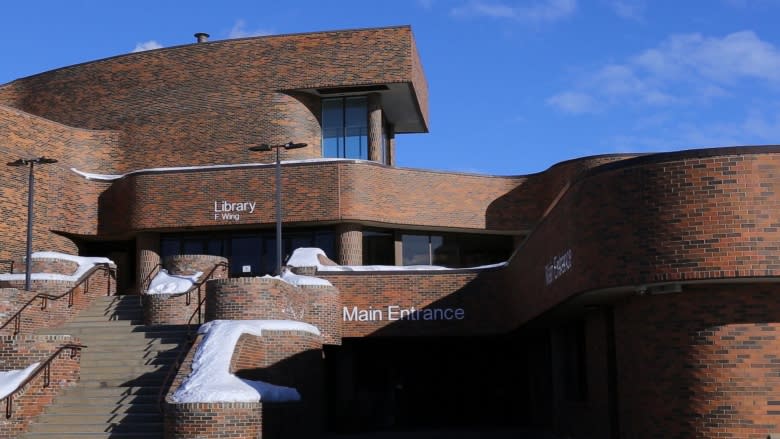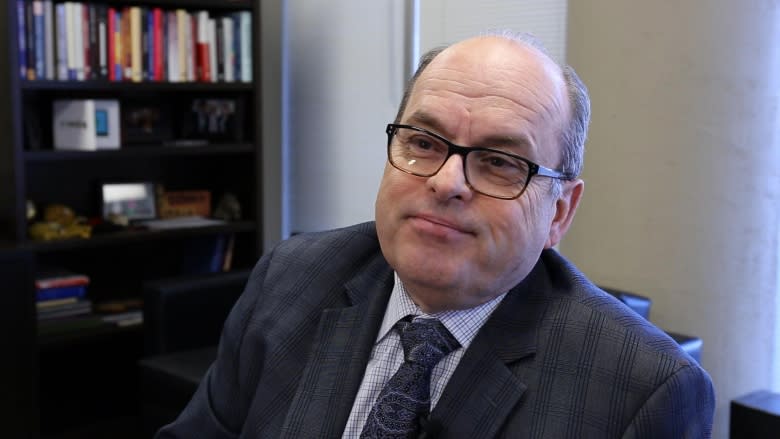Grande Prairie university degrees will reflect regional needs, college president says
Grande Prairie Regional College plans to offer up to five degree programs within two years, after receiving permission from the province to take the first steps toward becoming an accredited university.
The degrees will reflect employment demands in the region, said college president Don Gnatiuk, who cited education, nursing, animal science and business as potential programs to be developed.
"We will be able to put nuances in our degree programs that meet the specific needs of this region," Gnatiuk said.
"It's important that whatever we offer, first off, is it a bona fide demand in our service area?"
Planning started Monday, less than a week after Advanced Education Minister Marlin Schmidt announced on Feb. 22 the college would be allowed to grant degrees.
Each new degree must be evaluated and approved by the province, before it can be offered to students.
Grande Prairie Regional College is one of 26 publicly funded post-secondary institutions in Alberta.
The school, which has about 2,000 full-time students, is based in Grande Prairie, with additional campuses in Fairview, Hinton, Jasper, Grande Cache and Edson.
Online courses will open degrees to students at the five satellite campuses, Gnatiuk said.
"Ever since I've been here, people have made it clear, 'Please keep my kids at home,' " he said. "What happens is they go off somewhere else, they find other lives, and off they go. And then they don't come back."
Offering degrees through Grande Prairie Regional College will make post-secondary education more affordable for students in northern Alberta, Gnatiuk said.
"There's a huge cost to sending our kids away to school," he said. "Part of our equation is making education as accessible and robust as possible at home."
College will remain comprehensive
The college will consult with students and faculty to learn which degrees are most in demand. Once the first degrees have been chosen, the college will develop the programs based on its resources.
Some degrees will require funding for new teaching staff or equipment, Gnatiuk said. Engineering, for instance, will likely be too expensive a program for the college to run independently.
Eight degrees, including engineering, are already offered at the college in partnership with other post-secondary institutions in Alberta.
Students can begin their studies in Grande Prairie, before transferring to degree-granting schools in cities including Edmonton and Calgary.
The collaborative degrees are a head start for the college, should it decide to grant any of them independently, Gnatiuk said.
"We're not sure how to play that out yet, so we need to do a little internal and external assessment."
Grande Prairie Regional College must also complete an institutional readiness assessment, which could take until 2020.
Gnatiuk said he hopes the college's first set of degree programs can be developed concurrently, within the next two years.
"Our anticipation is that in two years... we will be able to say, 'We are institutionally ready and here are the degrees we're going to launch right away,' " Gnatiuk said.
The new degrees won't affect existing programs, he said.
"One of the things that we're defending fiercely in our region is the ability to be comprehensive, so that means granting degrees but it also means defending certificates, diplomas and trades in our region."
Once the first degrees are approved, Gnatiuk said the college will push to become an accredited university. He wants Grande Prairie Regional College to become Alberta's most northern university in about five years.
The next-closest accredited universities are more than 450 kilometres away, in Athabasca and Edmonton.
"The entire community is watching us to make sure we're developing our own professionals, we're developing our own apprentices and doing it ourselves, so we're not losing our talent," Gnatiuk said.
"We can't continue to rely on bringing talent in, we need to develop our own if we're going to be a sustainable community."
Good news for employers
The college's transformation into a university is good news for employers in the region, said Garth Braun, president of Blackbird Energy.
His company's oil and gas operations are based near Grande Prairie. Blackbird Energy hires up to 100 people when drilling.
Braun said he prefers local workers who are familiar with the region and pose less risk of leaving their jobs in the community.
"We've really struggled to have people that are trained and committed to stay here," he said. "When someone's from the community, there's less likelihood that they're going to depart.
"They're more grounded and they turn out to be more solid employees you can count on, versus being transient."
Braun, who is from Grande Prairie, said he wanted to complete his post-secondary education in the city 40 years ago but left because the local college didn't yet offer degrees.
He is now based in Calgary, but said he hopes the next generation of energy industry executives will be trained in the Peace region.
"I'm just excited that young people can get degrees from this area," he said. "It'll add another feature to grow Grande Prairie and give it even further stability."
@ZoeHTodd




